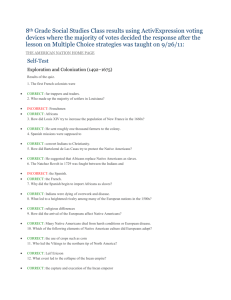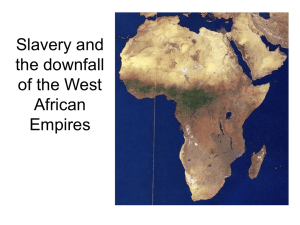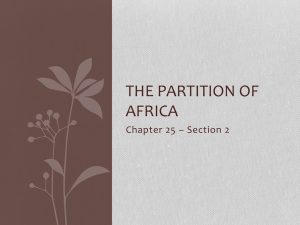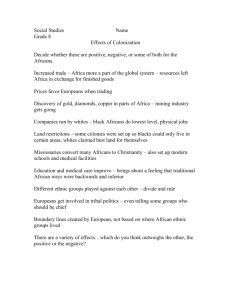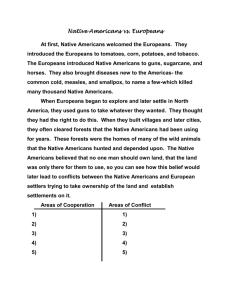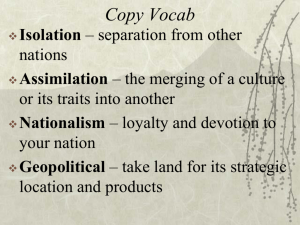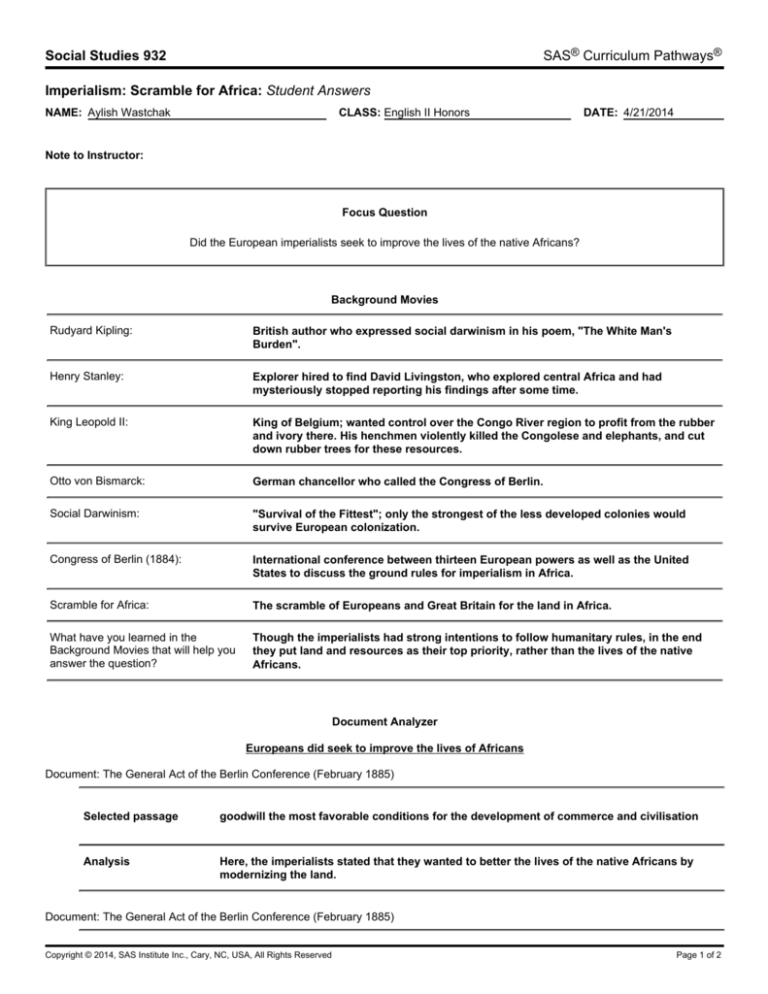
SAS® Curriculum Pathways®
Social Studies 932
Imperialism: Scramble for Africa: Student Answers
NAME: Aylish Wastchak
CLASS: English II Honors
DATE: 4/21/2014
Note to Instructor:
Focus Question
Did the European imperialists seek to improve the lives of the native Africans?
Background Movies
Rudyard Kipling:
British author who expressed social darwinism in his poem, "The White Man's
Burden".
Henry Stanley:
Explorer hired to find David Livingston, who explored central Africa and had
mysteriously stopped reporting his findings after some time.
King Leopold II:
King of Belgium; wanted control over the Congo River region to profit from the rubber
and ivory there. His henchmen violently killed the Congolese and elephants, and cut
down rubber trees for these resources.
Otto von Bismarck:
German chancellor who called the Congress of Berlin.
Social Darwinism:
"Survival of the Fittest"; only the strongest of the less developed colonies would
survive European colonization.
Congress of Berlin (1884):
International conference between thirteen European powers as well as the United
States to discuss the ground rules for imperialism in Africa.
Scramble for Africa:
The scramble of Europeans and Great Britain for the land in Africa.
What have you learned in the
Background Movies that will help you
answer the question?
Though the imperialists had strong intentions to follow humanitary rules, in the end
they put land and resources as their top priority, rather than the lives of the native
Africans.
Document Analyzer
Europeans did seek to improve the lives of Africans
Document: The General Act of the Berlin Conference (February 1885)
Selected passage
goodwill the most favorable conditions for the development of commerce and civilisation
Analysis
Here, the imperialists stated that they wanted to better the lives of the native Africans by
modernizing the land.
Document: The General Act of the Berlin Conference (February 1885)
Copyright © 2014, SAS Institute Inc., Cary, NC, USA, All Rights Reserved
Page 1 of 2
SAS® Curriculum Pathways®
Social Studies 932
Selected passage
co-operate in the suppression of slavery, and above all of the slave trade; they will protect
and encourage, without distinction of nationality or creed, all institutions ... tending to
educate the natives, and lead them to understand and appreciate the advantages of
civilisation.
Analysis
The imperialists wanted to suppress slavery, protect native values and educate them as well.
Document: French imperialist describes the purpose of colonization (1891)
Selected passage
This state of the world implies for the civilized people a right of intervention...
Analysis
Europeans say here that they feel they should intervene in order to "help" the tribes.
Europeans did not seek to improve the lives of Africans
Document: Request to open trade on the Niger River (February 21, 1877)
Selected passage
but lately within the last six years they have begun putting trading Stations at our places and
consequen[tly] they have stopped our trade completely as well as of those in the Lower part
of the River Niger ... This means starvation to my people
Analysis
(copied from outside
source)
The Europeans did not care that they were stopping the trade and essentially starving the
natives there.
Document: Request to open trade on the Niger River (February 21, 1877)
Selected passage
We have no land where we can grow plantains or yams and if we cannot trade we must
starve
Analysis
The native's land was taken by the greedy imperialists and because of this they couldn't
plant food to eat, and starved.
Document: Imperialist poem and two responses (1899-1900)
Selected passage
as a people we are essentially barbaric.
Analysis
The Europeans were brutal and selfish by taking the land of the natives and using it for
themselves.
Copyright © 2014, SAS Institute Inc., Cary, NC, USA, All Rights Reserved
Page 2 of 2

